Enactment
The law was named for its principal sponsors, Democratic Rep. Edwin Y. Webb of North Carolina and Republican Sen. William S. Kenyon of Iowa. Congress passed the legislation and sent it to the President on February 18, 1913. Ten days later, on February 28, 1913, President William Howard Taft, in the closing days of his administration, vetoed the law on constitutional grounds, believing that it delegated to the individual states the federal government's exclusive right to regulate interstate commerce. He submitted with his veto an opinion by Attorney General George W. Wickersham. The Senate overrode his veto the same day by a vote of 63 to 21, [2] and the House of Representatives did so by a vote of 246 to 85 on March 1, 1913. [1]

The Democratic Party is one of the two major contemporary political parties in the United States, along with the Republican Party. Tracing its heritage back to Thomas Jefferson and James Madison's Democratic-Republican Party, the modern-day Democratic Party was founded around 1828 by supporters of Andrew Jackson, making it the world's oldest active political party.

Edwin Yates Webb was a United States Representative from North Carolina and a United States District Judge of the United States District Court for the Western District of North Carolina.

North Carolina is a state in the southeastern region of the United States. It borders South Carolina and Georgia to the south, Tennessee to the west, Virginia to the north, and the Atlantic Ocean to the east. North Carolina is the 28th-most extensive and the 9th-most populous of the U.S. states. The state is divided into 100 counties. The capital is Raleigh, which along with Durham and Chapel Hill is home to the largest research park in the United States. The most populous municipality is Charlotte, which is the second-largest banking center in the United States after New York City.
The law did not simply prohibit the transport of alcoholic beverages into "dry" states, that is, states that banned alcohol. At the time of its passage and for years afterward, states varied greatly in their regulation of alcohol. Few banned alcohol entirely and were "bone-dry." Some allowed liquor to be ordered by mail but limited the amount per month per person or prohibited its receipt by businesses. They differed as well in their definitions of such beverages by alcohol content. The Webb–Kenyon Act established the federal government's endorsement of the right of each state to control the receipt, distribution, and consumption of alcoholic beverages within its jurisdiction. [3]
Its passage, followed shortly by the passage of an income tax, was recognized as a major progressive victory and gave added impetus to the prohibition movement's drive for a constitutional amendment to ban alcohol nationwide. [4]
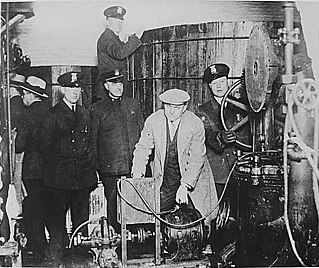
Prohibition in the United States was a nationwide constitutional ban on the production, importation, transportation, and sale of alcoholic beverages from 1920 to 1933.
Constitutionality
The act faced challenges in the courts and the courts differed in their consideration of its constitutionality. [5] Some lower courts declared complete bans on alcohol at the state level unconstitutional. The Supreme Court finally delivered an opinion of the Act on January 8, 1917 in the case of James Clark Distilling Co. v. Western Maryland R. Co. The Court sustained the Act by a vote of 7 to 2 in a decision by Chief Justice White in which a total of 6 justices concurred. The Court also affirmed the right of each state to regulate alcohol even to the extent of banning it completely. The case was a challenge to a West Virginia statute that banned shipments even for personal consumption. [6]

Edward Douglass White Jr., was an American politician and jurist from Louisiana. He was a United States Senator and the ninth Chief Justice of the United States. He served on the Supreme Court of the United States from 1894 to 1921. He is best known for formulating the Rule of Reason standard of antitrust law.
Congress responded to the Supreme Court decision by immediately enacting legislation to make the District of Columbia "bone-dry." [7]
Opponents of nationwide prohibition hoped the Supreme Court decision demonstrated that the ability of each state to exercise complete control over alcohol within its borders would make a constitutional amendment superfluous. "It is better," said the New York Times, "that prohibition laws should be made effective in communities that want them than that by a Federal amendment the rule of prohibition should be extended over unwilling States." [8]
The Supreme Court added a further decision upholding the law in its next term in a case involving a North Carolina statute requiring railroads to maintain records of liquor shipments and recipients. [9]

The Eighteenth Amendment of the United States Constitution established the prohibition of "intoxicating liquors" in the United States. The amendment was proposed by Congress on December 18, 1917, and was ratified by the requisite number of states on January 16, 1919. The Eighteenth Amendment was repealed by the Twenty-first Amendment on December 5, 1933.

The National Prohibition Act, known informally as the Volstead Act, was enacted to carry out the intent of the 18th Amendment, which established prohibition in the United States. The Anti-Saloon League's Wayne Wheeler conceived and drafted the bill, which was named for Andrew Volstead, Chairman of the House Judiciary Committee, who managed the legislation.

The Twenty-first Amendment to the United States Constitution repealed the Eighteenth Amendment to the United States Constitution, which had mandated nationwide Prohibition on alcohol. The Twenty-first Amendment was proposed by Congress on February 20, 1933, and was ratified by the requisite number of states on December 5, 1933. It is unique among the 27 amendments of the U.S. Constitution for being the only one to repeal a prior amendment, as well as being the only amendment to have been ratified by state ratifying conventions.

The Blaine Act, formally titled Joint Resolution Proposing the Twenty-First Amendment to the United States Constitution, is a joint resolution adopted by the United States Congress on February 20, 1933, initiating repeal of the 18th Amendment to the United States Constitution, which established Prohibition in the United States. Repeal was finalized when the 21st Amendment to the Constitution was ratified by the required minimum number of states on December 5, 1933.
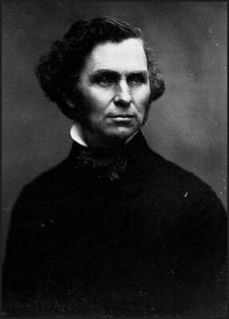
The Maine Law, passed in 1851 in Maine, was one of the first statutory implementations of the developing temperance movement in the United States.

Rum-running, or bootlegging, is the illegal business of transporting (smuggling) alcoholic beverages where such transportation is forbidden by law. Smuggling usually takes place to circumvent taxation or prohibition laws within a particular jurisdiction. The term rum-running is more commonly applied to smuggling over water; bootlegging is applied to smuggling over land.
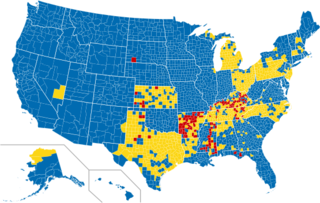
A dry county is a county in the United States whose government forbids the sale of any kind of alcoholic beverages. Some prohibit off-premises sale, some prohibit on-premises sale, and some prohibit both. Dozens of dry counties exist across the United States, a majority of them in the South. A number of smaller jurisdictions also exist, such as cities, towns, and townships, which prohibit the sale of alcoholic beverages. These are known as dry cities, dry towns, or dry townships. Dry jurisdictions can be contrasted with "wet" and "moist".
A local option is the ability of local political jurisdictions, typically counties or municipalities, to allow decisions on certain controversial issues based on popular vote within their borders. In practice, it usually relates to the issue of alcoholic beverage and marijuana sales.
The repeal of Prohibition in the United States was accomplished with the passage of the Twenty-first Amendment to the United States Constitution on December 5, 1933.
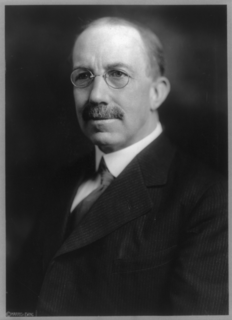
Wayne Bidwell Wheeler was an American attorney and longtime leader of the Anti-Saloon League. The leading advocate of the prohibitionist movement in the late 1800s and early 1900s, he played a major role in the passage of the Eighteenth Amendment to the United States Constitution, which outlawed the manufacture, distribution, and sale of alcoholic beverages.
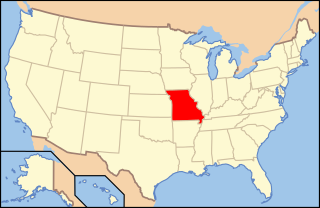
The alcohol laws of Missouri are among the most permissive in the United States. Missouri is known throughout the Midwest for its largely laissez-faire approach to alcohol regulation, in sharp contrast to the very strict alcohol laws of some of its neighbors, like Kansas and Oklahoma.

The alcohol laws of Kansas are among the strictest in the United States, in sharp contrast to its neighboring state of Missouri, and similar to its other neighboring state of Oklahoma. Legislation is enforced by the Kansas Division of Alcoholic Beverage Control.

Alcohol laws are laws in relation to the manufacture, use, being under the influence of and sale of alcohol or alcoholic beverages that contains ethanol. Common alcoholic beverages include beer, wine, and distilled spirits. The United States defines an alcoholic beverage as, "any beverage in liquid form which contains not less than one-half of one percent of alcohol by volume", but this definition varies internationally. These laws can restrict those who can produce alcohol, those who can buy it, when one can buy it, labelling and advertising, the types of alcoholic beverage that can be sold, where one can consume it, what activities are prohibited while intoxicated, and where one can buy it. In some cases, laws have even prohibited the use and sale of alcohol entirely, as with Prohibition in the United States from 1920 to 1933.

Alcohol prohibition in India is in force in the states of Bihar,
Gujarat, Mizoram and Nagaland as well as in the Union Territory of Lakshadweep. All other Indian states and union territories permit the sale of alcohol.
A dry state is a state in the United States in which the manufacture, distribution, importation, and sale of alcoholic beverages are prohibited or tightly restricted. While some states, such as North Dakota, entered the United States as dry states, others went dry after passage of prohibition legislation. Currently, no state in the United States remains completely dry, but some states contain dry counties.
Lambert v. Yellowley, 272 U.S. 581 (1926), was a decision by the Supreme Court of the United States that reaffirmed the National Prohibition Act's limitation on the dispensation of alcoholic medicines. The five-to-four decision, written by Justice Louis D. Brandeis, affirmed the dismissal of a suit in which New York City physician Samuel Lambert sought to prevent Edward Yellowley, the acting federal prohibition director, from enforcing the Prohibition Act so as to preclude him from prescribing alcoholic medicines. The decision affirmed the police powers of the individual states, as well as the power of the Necessary and Proper Clause of the United States Constitution, which was cited in upholding the Prohibition Act's limitations as a necessary and proper implementation of the Eighteenth Amendment to the United States Constitution.

Oklahoma Beer Act of 1933 is a United States public law legalizing the manufacture, possession, and sale of low-point beer in the State of Oklahoma. The Act of Congress cites the federal statute is binding with the cast of legal votes by the State of Oklahoma constituents or legislative action by the Oklahoma Legislature.















